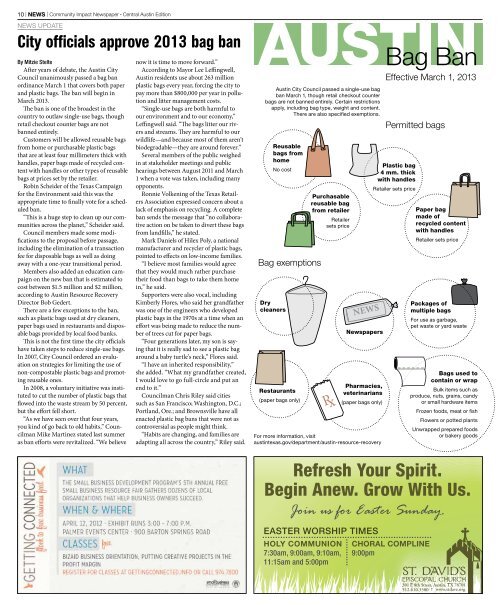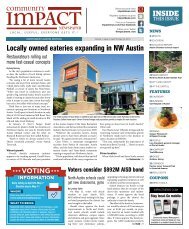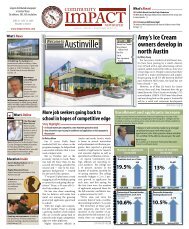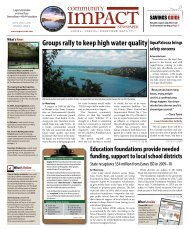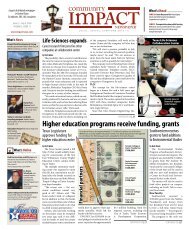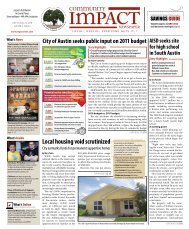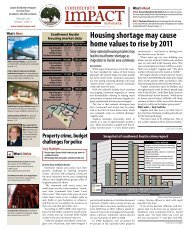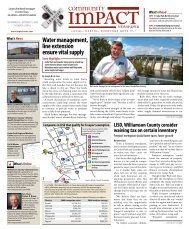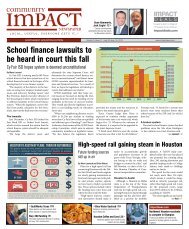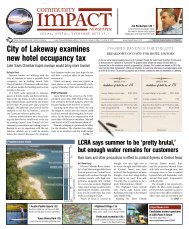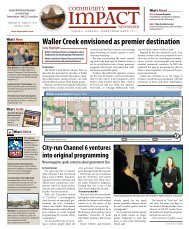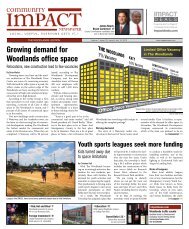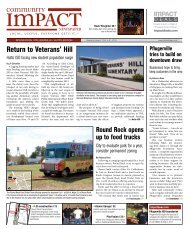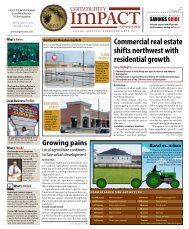Volume 4, Issue 5 | March 30–April 26 - Community Impact Newspaper
Volume 4, Issue 5 | March 30–April 26 - Community Impact Newspaper
Volume 4, Issue 5 | March 30–April 26 - Community Impact Newspaper
Create successful ePaper yourself
Turn your PDF publications into a flip-book with our unique Google optimized e-Paper software.
10 | NEWS | <strong>Community</strong> <strong>Impact</strong> <strong>Newspaper</strong> • Central Austin Edition<br />
neWs uPdate<br />
City officials approve 2013 bag ban<br />
By Mitzie Stelte<br />
After years of debate, the Austin City<br />
Council unanimously passed a bag ban<br />
ordinance <strong>March</strong> 1 that covers both paper<br />
and plastic bags. The ban will begin in<br />
<strong>March</strong> 2013.<br />
The ban is one of the broadest in the<br />
country to outlaw single-use bags, though<br />
retail checkout counter bags are not<br />
banned entirely.<br />
Customers will be allowed reusable bags<br />
from home or purchasable plastic bags<br />
that are at least four millimeters thick with<br />
handles, paper bags made of recycled content<br />
with handles or other types of reusable<br />
bags at prices set by the retailer.<br />
Robin Scheider of the Texas Campaign<br />
for the Environment said this was the<br />
appropriate time to finally vote for a scheduled<br />
ban.<br />
“This is a huge step to clean up our communities<br />
across the planet,” Scheider said.<br />
Council members made some modifications<br />
to the proposal before passage,<br />
including the elimination of a transaction<br />
fee for disposable bags as well as doing<br />
away with a one-year transitional period.<br />
Members also added an education campaign<br />
on the new ban that is estimated to<br />
cost between $1.5 million and $2 million,<br />
according to Austin Resource Recovery<br />
Director Bob Gedert.<br />
There are a few exceptions to the ban,<br />
such as plastic bags used at dry cleaners,<br />
paper bags used in restaurants and disposable<br />
bags provided by local food banks.<br />
This is not the first time the city officials<br />
have taken steps to reduce single-use bags.<br />
In 2007, City Council ordered an evaluation<br />
on strategies for limiting the use of<br />
non-compostable plastic bags and promoting<br />
reusable ones.<br />
In 2008, a voluntary initiative was instituted<br />
to cut the number of plastic bags that<br />
flowed into the waste stream by 50 percent,<br />
but the effort fell short.<br />
“As we have seen over that four years,<br />
you kind of go back to old habits,” Councilman<br />
Mike Martinez stated last summer<br />
as ban efforts were revitalized. “We believe<br />
now it is time to move forward.”<br />
According to Mayor Lee Leffingwell,<br />
Austin residents use about <strong>26</strong>3 million<br />
plastic bags every year, forcing the city to<br />
pay more than $800,000 per year in pollution<br />
and litter management costs.<br />
“Single-use bags are both harmful to<br />
our environment and to our economy,”<br />
Leffingwell said. “The bags litter our rivers<br />
and streams. They are harmful to our<br />
wildlife—and because most of them aren’t<br />
biodegradable—they are around forever.”<br />
Several members of the public weighed<br />
in at stakeholder meetings and public<br />
hearings between August 2011 and <strong>March</strong><br />
1 when a vote was taken, including many<br />
opponents.<br />
Ronnie Volkening of the Texas Retailers<br />
Association expressed concern about a<br />
lack of emphasis on recycling. A complete<br />
ban sends the message that “no collaborative<br />
action on be taken to divert these bags<br />
from landfills,” he stated.<br />
Mark Daniels of Hilex Poly, a national<br />
manufacturer and recycler of plastic bags,<br />
pointed to effects on low-income families.<br />
“I believe most families would agree<br />
that they would much rather purchase<br />
their food than bags to take them home<br />
in,” he said.<br />
Supporters were also vocal, including<br />
Kimberly Flores, who said her grandfather<br />
was one of the engineers who developed<br />
plastic bags in the 1970s at a time when an<br />
effort was being made to reduce the number<br />
of trees cut for paper bags.<br />
“Four generations later, my son is saying<br />
that it is really sad to see a plastic bag<br />
around a baby turtle’s neck,” Flores said.<br />
“I have an inherited responsibility,”<br />
she added. “What my grandfather created,<br />
I would love to go full-circle and put an<br />
end to it.”<br />
Councilman Chris Riley said cities<br />
such as San Francisco; Washington, D.C.;<br />
Portland, Ore.; and Brownsville have all<br />
enacted plastic bag bans that were not as<br />
controversial as people might think.<br />
“Habits are changing, and families are<br />
adapting all across the country,” Riley said.<br />
austin City Council passed a single-use bag<br />
ban <strong>March</strong> 1, though retail checkout counter<br />
bags are not banned entirely. Certain restrictions<br />
apply, including bag type, weight and content.<br />
there are also specified exemptions.<br />
Reusable<br />
bags from<br />
home<br />
no cost<br />
Bag exemptions<br />
Dry<br />
cleaners<br />
Restaurants<br />
(paper bags only)<br />
Purchasable<br />
reusable bag<br />
from retailer<br />
retailer<br />
sets price<br />
<strong>Newspaper</strong>s<br />
Pharmacies,<br />
veterinarians<br />
(paper bags only)<br />
For more information, visit<br />
austintexas.gov/department/austin-resource-recovery<br />
Bag Ban<br />
Effective <strong>March</strong> 1, 2013<br />
Permitted bags<br />
Plastic bag<br />
4 mm. thick<br />
with handles<br />
retailer sets price<br />
Paper bag<br />
made of<br />
recycled content<br />
with handles<br />
retailer sets price<br />
Packages of<br />
multiple bags<br />
For use as garbage,<br />
pet waste or yard waste<br />
Bags used to<br />
contain or wrap<br />
Bulk items such as<br />
produce, nuts, grains, candy<br />
or small hardware items<br />
Frozen foods, meat or fish<br />
Flowers or potted plants<br />
unwrapped prepared foods<br />
or bakery goods<br />
Refresh Your Spirit.<br />
Begin Anew. Grow With Us.<br />
Join us for Easter Sunday.<br />
EASTER WORSHIP TIMES<br />
HOLY COMMUNION<br />
7:30am, 9:00am, 9:10am,<br />
11:15am and 5:00pm<br />
CHORAL COMPLINE<br />
9:00pm


